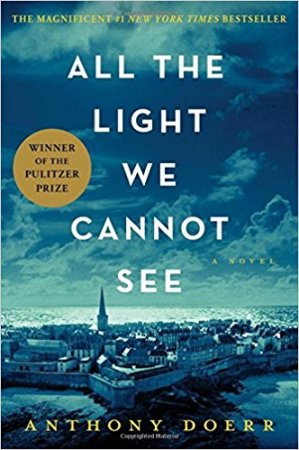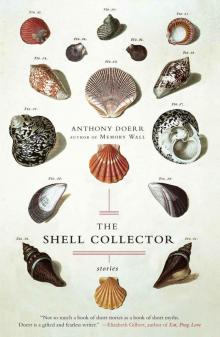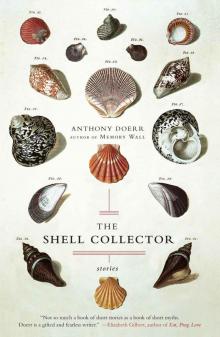- Home
- Anthony Doerr
All the Light We Cannot See: A Novel Page 5
All the Light We Cannot See: A Novel Read online
Page 5
“Papa says curses are only stories cooked up to deter thieves. He says there are sixty-five million specimens in this place, and if you have the right teacher, each can be as interesting as the last.”
“Still,” he says, “certain things compel people. Pearls, for example, and sinistral shells, shells with a left-handed opening. Even the best scientists feel the urge now and then to put something in a pocket. That something so small could be so beautiful. Worth so much. Only the strongest people can turn away from feelings like that.”
They are quiet a moment.
Marie-Laure says, “I heard that the diamond is like a piece of light from the original world. Before it fell. A piece of light rained to earth from God.”
“You want to know what it looks like. That’s why you’re so curious.”
She rolls a murex in her hands. Holds it to her ear. Ten thousand drawers, ten thousand whispers inside ten thousand shells.
“No,” she says. “I want to believe that Papa hasn’t been anywhere near it.”
Open Your Eyes
Werner and Jutta find the Frenchman’s broadcasts again and again. Always around bedtime, always midway through some increasingly familiar script.
Today let’s consider the whirling machinery, children, that must engage inside your head for you to scratch your eyebrow . . . They hear a program about sea creatures, another about the North Pole. Jutta likes one on magnets. Werner’s favorite is one about light: eclipses and sundials, auroras and wavelengths. What do we call visible light? We call it color. But the electromagnetic spectrum runs to zero in one direction and infinity in the other, so really, children, mathematically, all of light is invisible.
Werner likes to crouch in his dormer and imagine radio waves like mile-long harp strings, bending and vibrating over Zollverein, flying through forests, through cities, through walls. At midnight he and Jutta prowl the ionosphere, searching for that lavish, penetrating voice. When they find it, Werner feels as if he has been launched into a different existence, a secret place where great discoveries are possible, where an orphan from a coal town can solve some vital mystery hidden in the physical world.
He and his sister mimic the Frenchman’s experiments; they make speedboats out of matchsticks and magnets out of sewing needles.
“Why doesn’t he say where he is, Werner?”
“Maybe because he doesn’t want us to know?”
“He sounds rich. And lonely. I bet he does these broadcasts from a huge mansion, big as this whole colony, a house with a thousand rooms and a thousand servants.”
Werner smiles. “Could be.”
The voice, the piano again. Perhaps it’s Werner’s imagination, but each time he hears one of the programs, the quality seems to degrade a bit more, the sound growing fainter: as though the Frenchman broadcasts from a ship that is slowly traveling farther away.
As the weeks pass, with Jutta asleep beside him, Werner looks out into the night sky, and restlessness surges through him. Life: it’s happening beyond the mills, beyond the gates. Out there people chase questions of great importance. He imagines himself as a tall white-coated engineer striding into a laboratory: cauldrons steam, machinery rumbles, complex charts paper the walls. He carries a lantern up a winding staircase to a starlit observatory and looks through the eyepiece of a great telescope, its mouth pointed into the black.
Fade
Maybe the old tour guide was off his rocker. Maybe the Sea of Flames never existed at all, maybe curses aren’t real, maybe her father is right: Earth is all magma and continental crust and ocean. Gravity and time. Stones are just stones and rain is just rain and misfortune is just bad luck.
Her father returns to the key pound earlier in the evenings. Soon he is taking Marie-Laure along on various errands again, teasing her about the mountains of sugar she spoons into her coffee or bantering with warders about the superiority of his brand of cigarettes. No dazzling new gemstone goes on exhibit. No plagues rain down upon museum employees; Marie-Laure does not succumb to snakebite or tumble into a sewer and break her back.
On the morning of her eleventh birthday, she wakes to find two new packages where the sugar bowl should be. The first is a lacquered wooden cube constructed entirely from sliding panels. It takes thirteen steps to open, and she discovers the sequence in under five minutes.
“Good Christ,” says her father, “you’re a safecracker!”
Inside the cube: two Barnier bonbons. She unwraps both and puts them in her mouth at the same time.
Inside the second package: a fat stack of pages with Braille on the cover. Twenty. Thousand. Leagues. Under. The. Sea.
“The bookseller said it’s in two parts, and this is the first. I thought that next year, if we keep saving, we can get the second—”
She begins that instant. The narrator, a famed marine biologist named Pierre Aronnax, works at the same museum as her father! Around the world, he learns, ships are being rammed one after another. After a scientific expedition to America, Aronnax ruminates over the true nature of the incidents. Are they caused by a moving reef? A gigantic horned narwhal? A mythical kraken?
But I am letting myself be carried away by reveries which I must now put aside, writes Aronnax. Enough of these phantasies.
All day Marie-Laure lies on her stomach and reads. Logic, reason, pure science: these, Aronnax insists, are the proper ways to pursue a mystery. Not fables and fairy tales. Her fingers walk the tightropes of sentences; in her imagination, she walks the decks of the speedy two-funneled frigate called the Abraham Lincoln. She watches New York City recede; the forts of New Jersey salute her departure with cannons; channel markers bob in the swells. A lightship with twin beacons glides past as America recedes; ahead wait the great glittering prairies of the Atlantic.
The Principles of Mechanics
A vice minister and his wife visit Children’s House. Frau Elena says they are touring orphanages.
Everyone washes; everyone behaves. Maybe, the children whisper, they are considering adopting. The oldest girls serve pumpernickel and goose liver on the house’s last unchipped plates while the portly vice minister and his severe-looking wife inspect the parlor like lords come to tour some distasteful gnomish cottage. When supper is ready, Werner sits at the boys’ end of the table with a book in his lap. Jutta sits with the girls at the opposite end, her hair frizzed and snarled and bright white, so she looks as if she has been electrified.
Bless us O Lord and these Thy gifts. Frau Elena adds a second prayer for the vice minister’s benefit. Everyone falls to eating.
The children are nervous; even Hans Schilzer and Herribert Pomsel sit quietly in their brown shirts. The vice minister’s wife sits so upright that it seems as if her spine is hewn from oak.
Her husband says, “And each of the children contributes?”
“Certainly. Claudia, for instance, made the bread basket. And the twins prepared the livers.”
Big Claudia Förster blushes. The twins bat their eyelashes.
Werner’s mind drifts; he is thinking about the book in his lap, The Principles of Mechanics by Heinrich Hertz. He discovered it in the church basement, water-stained and forgotten, decades old, and the rector let him bring it home, and Frau Elena let him keep it, and for several weeks Werner has been fighting through the thorny mathematics. Electricity, Werner is learning, can be static by itself. But couple it with magnetism, and suddenly you have movement—waves. Fields and circuits, conduction and induction. Space, time, mass. The air swarms with so much that is invisible! How he wishes he had eyes to see the ultraviolet, eyes to see the infrared, eyes to see radio waves crowding the darkening sky, flashing through the walls of the house.
When he looks up, everyone is staring at him. Frau Elena’s eyes are alarmed.
“It’s a book, sir,” announces Hans Schilzer. He tugs it out of Werner’s lap. The volume is heavy enough that he needs both hands to hold it up.
Several creases sharpen in the forehead of the vice minister’
s wife. Werner can feel his cheeks flush.
The vice minister extends a pudgy hand. “Give it here.”
“Is it a Jew book?” says Herribert Pomsel. “It’s a Jew book, isn’t it?”
Frau Elena looks as if she’s about to speak, then thinks better of it.
“Hertz was born in Hamburg,” says Werner.
Jutta announces out of nowhere, “My brother is so quick at mathematics. He’s quicker than every one of the schoolmasters. Someday he’ll probably win a big prize. He says we’ll go to Berlin and study under the great scientists.”
The younger children gape; the oldest children snicker. Werner stares hard into his plate. The vice minister frowns as he turns pages. Hans Schilzer kicks Werner in the shin and coughs.
Frau Elena says, “Jutta, that’s enough.”
The vice minister’s wife takes a forkful of liver and chews and swallows and touches her napkin to each corner of her mouth. The vice minister sets down The Principles of Mechanics and pushes it away, then glances at his palms as though it has made them dirty. He says, “The only place your brother is going, little girl, is into the mines. As soon as he turns fifteen. Same as every other boy in this house.”
Jutta scowls, and Werner stares at the congealed liver on his plate with his eyes burning and something inside his chest compressing tighter and tighter, and for the rest of supper the only sound is of the children cutting and chewing and swallowing.
Rumors
New rumors arrive. They rustle along the paths of the Jardin des Plantes and wind through the museum galleries; they echo in high dusty redoubts where shriveled old botanists study exotic mosses. They say the Germans are coming.
The Germans, a gardener claims, have sixty thousand troop gliders; they can march for days without eating; they impregnate every schoolgirl they meet. A woman behind the ticket counter says the Germans carry fog pills and wear rocket belts; their uniforms, she whispers, are made of a special cloth stronger than steel.
Marie-Laure sits on a bench beside the mollusk display and trains her ears on passing groups. A boy blurts, “They have a bomb called the Secret Signal. It makes a sound, and everyone who hears it goes to the bathroom in their pants!”
Laughter.
“I hear they give out poisoned chocolate.”
“I hear they lock up the cripples and morons everywhere they go.”
Each time Marie-Laure relays another rumor to her father, he repeats “Germany” with a question mark after it, as if saying it for the very first time. He says the takeover of Austria is nothing to worry about. He says everyone remembers the last war, and no one is mad enough to go through that again. The director is not worrying, he says, and neither are the department heads, so neither should young girls who have lessons to learn.
It seems true: nothing changes but the day of the week. Every morning Marie-Laure wakes and dresses and follows her father through Entrance #2 and listens to him greet the night guard and the warder. Bonjour bonjour. Bonjour bonjour. The scientists and librarians still collect their keys in the mornings, still study their ancient elephants’ teeth, their exotic jellyfish, their herbarium sheets. The secretaries still talk about fashion; the director still arrives in a two-tone Delage limousine; and every noon the African vendors still wheel their sandwich carts quietly down the halls with their whispers of rye and egg, rye and egg.
Marie-Laure reads Jules Verne in the key pound, on the toilet, in the corridors; she reads on the benches of the Grand Gallery and out along the hundred gravel paths of the gardens. She reads the first half of Twenty Thousand Leagues Under the Sea so many times, she practically memorizes it.
The sea is everything. It covers seven tenths of the globe . . . The sea is only a receptacle for all the prodigious, supernatural things that exist inside it. It is only movement and love; it is the living infinite.
At night, in her bed, she rides in the belly of Captain Nemo’s Nautilus, below the gales, while canopies of coral drift overhead.
Dr. Geffard teaches her the names of shells—Lambis lambis, Cypraea moneta, Lophiotoma acuta—and lets her feel the spines and apertures and whorls of each in turn. He explains the branches of marine evolution and the sequences of the geologic periods; on her best days, she glimpses the limitless span of millennia behind her: millions of years, tens of millions.
“Nearly every species that has ever lived has gone extinct, Laurette. No reason to think we humans will be any different!” Dr. Geffard pronounces this almost gleefully and pours wine into his glass, and she imagines his head as a cabinet filled with ten thousand little drawers.
All summer the smells of nettles and daisies and rainwater purl through the gardens. She and her father cook a pear tart and burn it by accident, and her father opens all the windows to let out the smoke, and she hears violin music rise from the street below. And yet by early autumn, once or twice a week, at certain moments of the day, sitting out in the Jardin des Plantes beneath the massive hedges or reading beside her father’s workbench, Marie-Laure looks up from her book and believes she can smell gasoline under the wind. As if a great river of machinery is steaming slowly, irrevocably, toward her.
Bigger Faster Brighter
Membership in the State Youth becomes mandatory. The boys in Werner’s Kameradschaften are taught parade maneuvers and quizzed on fitness standards and required to run sixty meters in twelve seconds. Everything is glory and country and competition and sacrifice.
Live faithfully, the boys sing as they troop past the edges of the colony. Fight bravely and die laughing.
Schoolwork, chores, exercise. Werner stays up late listening to his radio or driving himself through the complicated math he copied out of The Principles of Mechanics before it was confiscated. He yawns at meals, is short-tempered with the younger children. “Are you feeling okay?” asks Frau Elena, peering into his face, and Werner looks away, saying, “Fine.”
Hertz’s theories are interesting but what he loves most is building things, working with his hands, connecting his fingers to the engine of his mind. Werner repairs a neighbor’s sewing machine, the Children’s House grandfather clock. He builds a pulley system to wind laundry from the sunshine back indoors, and a simple alarm made from a battery, a bell, and wire so that Frau Elena will know if a toddler has wandered outside. He invents a machine to slice carrots: lift a lever, nineteen blades drop, and the carrot falls apart into twenty neat cylinders.
One day a neighbor’s wireless goes out, and Frau Elena suggests Werner have a look. He unscrews the back plate, waggles the tubes back and forth. One is not seated properly, and he fits it back into its groove. The radio comes back to life, and the neighbor shrieks with delight. Before long, people are stopping by Children’s House every week to ask for the radio repairman. When they see thirteen-year-old Werner come down from the attic, rubbing his eyes, shocks of white hair sticking up off his head, homemade toolbox hanging from his fist, they stare at him with the same skeptical smirk.
The older sets are the easiest to fix: simpler circuitry, uniform tubes. Maybe it’s wax dripping from the condenser or charcoal built up on a resistor. Even in the newest sets, Werner can usually puzzle out a solution. He dismantles the machine, stares into its circuits, lets his fingers trace the journeys of electrons. Power source, triode, resistor, coil. Loudspeaker. His mind shapes itself around the problem, disorder becomes order, the obstacle reveals itself, and before long the radio is fixed.
Sometimes they pay him a few marks. Sometimes a coal mother cooks him sausages or wraps biscuits in a napkin to take home to his sister. Before long Werner can draw a map in his head of the locations of nearly every radio in their district: a homemade crystal set in the kitchen of a druggist; a handsome ten-valve radiogram in the home of a department head that was giving his fingers a shock every time he tried to change the channel. Even the poorest pit houses usually possess a state-sponsored Volksemfänger VE301, a mass-produced radio stamped with an eagle and a swastika, incapable of shortwave, mark
ed only for German frequencies.
Radio: it ties a million ears to a single mouth. Out of loudspeakers all around Zollverein, the staccato voice of the Reich grows like some imperturbable tree; its subjects lean toward its branches as if toward the lips of God. And when God stops whispering, they become desperate for someone who can put things right.
Seven days a week the miners drag coal into the light and the coal is pulverized and fed into coke ovens and the coke is cooled in huge quenching towers and carted to the blast furnaces to melt iron ore and the iron is refined into steel and cast into billets and loaded onto barges and floated off into the great hungry mouth of the country. Only through the hottest fires, whispers the radio, can purification be achieved. Only through the harshest tests can God’s chosen rise.
Jutta whispers, “A girl got kicked out of the swimming hole today. Inge Hachmann. They said they wouldn’t let us swim with a half-breed. Unsanitary. A half-breed, Werner. Aren’t we half-breeds too? Aren’t we half our mother, half our father?”
“They mean half-Jew. Keep your voice down. We’re not half-Jews.”
“We must be half something.”
“We’re whole German. We’re not half anything.”
Herribert Pomsel is fifteen years old now, off in a miners’ dormitory, working the second shift as a firedamper, and Hans Schilzer has become the oldest boy in the house. Hans does push-ups by the hundreds; he plans to attend a rally in Essen. There are fistfights in the alleys, rumors that Hans has set a car on fire. One night Werner hears him downstairs, shouting at Frau Elena. The front door slams; the children toss in their beds; Frau Elena paces the parlor, her slippers whispering left, whispering right. Coal cars grind past in the wet dark. Machinery hums in the distance: pistons throbbing, belts turning. Smoothly. Madly.

 All the Light We Cannot See
All the Light We Cannot See About Grace
About Grace Four Seasons in Rome: On Twins, Insomnia, and the Biggest Funeral in the History of the World
Four Seasons in Rome: On Twins, Insomnia, and the Biggest Funeral in the History of the World Memory Wall
Memory Wall The Best American Short Stories 2019
The Best American Short Stories 2019 Four Seasons in Rome
Four Seasons in Rome The Shell Collector
The Shell Collector All the Light We Cannot See: A Novel
All the Light We Cannot See: A Novel Memory Wall: Stories
Memory Wall: Stories Shell Collector
Shell Collector